|
Somebody asked if I would write a blog with advice for younger athletes, so I thought I’d write it based on what I feel did/didn’t benefit me as I grew up. A little bit like a message to my younger self. Since the start of my running journey, I have had quite a roller coaster of a ride. There have been some great ups, but there have been a lot of downs. When I reflect on some of these, I know they all happened for a reason, in order to educate my younger self, but if I could tell these to someone else before they have to experience them, I would say: Enjoy ALL the sports. Running is great, and I focus solely on it now, but there is no need to when you are at school. When I was at school, I did EVERY sport going. My friends and I would do everything from basketball, to hockey, to tennis and gymnastics. Whatever sport it was, we would do it. There was nothing we would say no to. As a result, we spent every lunch break and after school doing a sports club of some sort. When I look back on it now, I think this was a very valuable thing to do. Not only did it allow me to discover what sports I enjoyed the most, but it meant my body was never being strained in one particular way too early. When you are young, it is very easy to be active, and being active is enough to allow you to do well at running at a young age. Doing all these other sports gave me the fitness I needed to do the school cross country races, and run them well, without doing too much running too soon. It’s ok to feel out of control. As I reached my older school years, I struggled with the concept of being out of control. I still do at times, but I know how not to act. When I was younger, I wasn’t even aware that my actions were due to feeling out of control. When life threw lemons at me, I restricted what I ate. I thought this was a good thing to do, but it was far from that. If I could, I would tell my younger self that it is ok to let go, to be scared, to fear the future, and to feel lost, but I don’t need to act on this by controlling my food and thinking it was a good thing for my running. I would make myself aware that my restrictive behaviours were due to the way I was feeling and I would encourage others to speak up about their emotions. I would say to younger athletes, it’s ok to worry about the future and where life will take you, but restricting your food won’t make anything better. If you notice yourself doing these behaviours, speak to someone, whether it be a teacher or a relative, because they can help you understand what you are struggling with at that time of your life. Just understand that restricting your food won’t fix anything, it will only cause more damage, and it won't benefit your performance in any way. Go to your local club.
This is something I didn’t do at a young age. I was always very nervous to join the local athletics club because I thought I wasn’t good enough. I found the concept very scary and overwhelming. I don’t regret not going as I had an incredible coach that I trained with each week and I wouldn't have changed that for the world, but I would recommend others who don’t have a coach, head down to their local club. You can be of ANY standard to go to your local athletics club. It is a great way to meet others with similar interests. It also allows you try different types of events in order to find out which one you enjoy the most. Don’t compare yourself to others. As we grow up, especially with the strong presence of social media, we become very aware of the way other people are living their lives. Without realising, it can cause us to feel we should be doing things differently. You may see other athletes doing more training than you, or taking it more seriously at a young age, but I would say, focus on your own journey because what matters most is what you achieve when you’re older, not when you’re young. Having fun with other sports when you’re younger is only going to benefit your running when you’re older. It sounds cliche, but everyone is also on their own journey, some people who are running amazingly at a young age, may stop progressing quite early on, whereas others may develop later on. For this reason, don’t worry about where you’re at now, because you time will come later on. Puberty also plays a huge part in how you perform at a young age. Different people experience it at different times and to different extents, so don’t stress about what others are doing, just focus on your own experiences and do what is right for you. Have fun! When you’re younger, the most important thing to ensure you stay in the sport for a long time is that you enjoy it. You’re only going to want to stick with something and give your all to it when you grow up, if you love it. For this reason, don’t put too much pressure on yourself. Run when you want to run, enjoy racing, but have fun with it. I used to get so so nervous for races when I was at school, and I look back now and ask myself why? It didn’t put me off the sport at all, but it did mean I would spend weeks worrying about an upcoming race, when I could've been enjoying other things. There is plenty of time ahead to take it more seriously. If you enjoy it now, you’ll continue to enjoy it when you’re older and enjoy giving more time to it. Don't wish time away. For a lot of my younger years, I remember being so desperate to grow up. I couldn't wait until I could run more, have more freedom, do other things, and it felt like these things were lifetimes away. However, the time has flown by so so quickly. So much so that I wish I had enjoyed that time a little more and not longed for the future. Yes the future is great and there are so many options in life, but it also has its struggles, just like you think being a child does. Enjoy the lack of responsibility and the purity of being a kid, because it's pretty fun.
1 Comment
Yesterday marked a year since I raced at the Commonwealth Games in Birmingham. This also marks a year since my injury. When I reflect on the time, what was initially a period filled with disappointment, has now become something I reflect upon with positivity. At the time, I didn’t think what had happened could be positive, but it is only now that I see it was. I hear you asking, why? Well, here’s why. Learned so many lessons. Prior to my injury, I didn’t think I needed to learn many lessons. I thought I was doing most of what I needed to be doing . However, I didn’t realise that life is a constant learning process. We learn new things every single day, even when we don’t think we are. When I became injured, I realised that perhaps I hadn’t been doing things exactly as I needed to, and my injury was my body telling me this. Sometimes our minds can’t see circumstances completely clearly, but my body could, and it was telling me that I needed to learn from what had happened. I took on board so many new lessons over my injury, and I continue to learn every single day! Made positive changes. Once I had been able to overcome the initial emotions and reflect on what had happened, I was able to identify where I went wrong. My injury also allowed me to start back from scratch and implement some things I hadn’t found the right time to bring in. One of these key things was strength and conditioning. I had never really had a structured S&C plan. I did the same very basic S&C programme three times a week, and had been doing that for about 5 years! Essentially, it wasn’t benefiting me in any way anymore. On my return, I was able to make S&C a staple part of my weekly training routine from the get go. Therefore I was able to slowly build it up as I built up my running volume, so the two progressed naturally together without hindering my running. S&C is something I actually love and I already have a lot to thank my S&C coach for on the return. Dealing with problems when they arise. I was a bit sucker for ignoring warning signs prior to my injury. If something didn’t feel quite right, I would ignore it until it became too much to ignore. I wouldn’t speak about it and would just plough on. This helps no one. I now address anything out of the ordinary as soon as it arises and notify my coach of it so he is aware of any slight sensation, no matter how small it is. This means we can address problems whilst they are small, so they do not then progress into something bigger. Mentally and physically stronger than ever before.
I have never been one to fear the possibility of things going wrong. I love it when plans go exactly as they should, but I also thrive off them not going to plan. This has always boosted me and motivated me so much afterwards. The post-commonwealth games feeling was pretty tough and the injury process was very long winded. I thought I’d lost all I had worked for at the time. However, I’ve actually come back from my injury so much stronger and I know this will benefit me massively into the future. It showed me that I can overcome a lot, and therefore when it comes to running, I don’t have much to fear. As a result, I feel a lot more mentally stable and strong, but also more mature. I feel I am a lot more rational when it comes to training, and able to see what is best for me, as opposed to focusing on what I ‘should’ be doing. Trust the process. I believe, to some extent, everything happens for a reason, and what happens might not be exactly what you want, but it’s what you need at that moment. I have come to find joy in the process so much more than I did this time last year. I have found myself no longer constantly reaching for the end goal, but instead enjoying where I am each day. Whatever will happen will happen, so as long as I work my hardest consistently, I will get to wherever I’m able to get. I am able to accept when I need to back off, listen to what my body is telling me, take it super easy when I need to, push hard at the right times, and ride the ups and downs without getting too up or down. I hope this blog shows that injuries or setbacks in life aren’t all bad, and they actually teach as so many valuable lessons. Mostly the lessons we didn't know we needed to learn. We all have those days and weeks where we feel like our goals are a million miles away. You will have days where you contemplate whether you’ll ever achieve what you have set your sights on, but this is where the power lies and this is what separates those who achieve their goals from those who don’t. It’s pretty self explanatory, but if you give up on your goals because they don’t seem to be getting any closer, you never will achieve them. The person you should fear the most, is the person that never gives up, because they will always be one step closer to their goals than the person that gave up. So, why should you keep showing up? Hard work pays off. I don’t say this as someone who has achieved all their goals, because I haven’t. However, I am a firm believer that this is the case, because I have progressed further than I initially thought possible, purely through hard work. The one thing that no one can ever question, is the person that works hard. If you are willing to put your time and focus into something over a long period of time, I believe you will reap the rewards for this. When the hard work will pay off, no one knows, but if you keep showing up and keep putting in the work, it will all come together at some point. If you gave up, you would never know if your goals were maybe just around the corner. Enjoy the journey. This is absolutely key. Challenging periods are unavoidable in life, but if we trust/enjoy the journey, it makes them a little bit easier to get through. It also ensures that you aren’t always waiting for the end goal. We will achieve our goals, but then they will be in the past and we will look towards something else, therefore, the goal should never be what we see as our source of happiness. The journey makes up the majority of our time, so if we enjoy what we’re doing, it’s never a chore to keep ticking off the days. Enjoying the journey of work along the way should be where the priority lies. Doesn’t need to make sense to anybody else.
People will have opinions. They always do, and that’s ok, but you don’t need to let these opinions change what you’re doing. It is important to stick to what you want to do and ensure any negative opinions bounce off of you. You don’t need to explain to others why you are doing what you are doing with your life. As long as it makes sense to you, then keep showing up day in and out. No one is guaranteed success, so if you know why you’re doing what you’re doing, then that’s all that matters. Believe in yourself. Goals aren’t meant to be easy. If they were, everyone would have achieved what you set your sights on. This is what makes something so much more worthwhile when you achieve it, because you have battled in order to get there. For this reason, have faith and believe in yourself. The journey is not meant to be easy, so don’t interpret slow progress or difficult times as a sign of your weakness, it is instead a sign of the challenge you are embarking on. When times get tough, believe in yourself to get through them, and know that everything will eventually turn out exactly as it needs to. Just don’t give up. This week I broke my 10 year hiatus and ran a 1500m race! Sounds scary right? Especially to a distance runner. However, I was actually really excited to race the distance! I think it didn’t feel quite as scary as I initially thought it would, because I did a mile race a few weeks ago. I found the mile had the positive effect of enticing me in, rather than scaring me away. Long story short, I ran an open meet, so I was racing against guys, and ran a 38 (I thought it was 39) second PB of 4.18. My previous best was from 4.56 from 2014. I thought I’d use this blog to answer the questions you may be wondering. If you have any questions that I haven’t answered, drop me a message and I’ll do my best to answer :) HOW?! I hear you asking yourself, how did a 10,000m runner manage to run a 1500m race?! And you would be justified in wondering this. However, speed is something I have really been working on the past couple of weeks in my sessions. This has really helped sharpen my legs up and get them a little bit more comfortable moving faster. There is still a lot more work to do, and they still aren’t quite as reactive as we’d like, but progress is being made, and that’s the most important thing. Why? Speed always has been my weakness. For so long I have struggled to move my legs at any pace faster than 5k pace. This has always put me at a disadvantage when races go from slow to fast quite suddenly, or when it comes down to the final sprint. Therefore, in order to improve this, I have been working on my speed and doing some shorter races. Also, if I can get my legs and mind more confident moving at faster paces, I will be much more confident at moving faster in the 5k and 10k. The shorter distances will therefore allow me to improved in my main events, something which is obviously our main aim. Did you do anything differently before?
This time round, the race was on a Wednesday evening. On Monday I therefore did a few 200m’s in the middle of my easy run to get the legs turning over, but this isn’t really out of the ordinary. I would tend to do something shorter a few days before a race. Everything else was the same as always. The day before the race, the race morning, the warm up, the food I ate on race day, it was all the same as it would be for any other race. Did I enjoy it? I actually really really enjoyed it! I didn’t think I would enjoy it quite as much as I did, but it was exciting. Compared to the longer distance races I usually do, it was over with in a heartbeat. I found myself having to be super focused and on it in order to not make any mistakes or let my mind wonder, because it would be over so quickly. It was also fun to do an event that wasn’t my main focus so there was no pressure, but one that I know is benefitting the distances I am focusing on. Will you do another one? Absolutely! Doing the shorter distance races is so beneficial to the longer distances that I focus on, so I will absolutely keep them as part of my racing schedule. I find them really helpful ahead of a 3,000m or 5,000m as they get my legs moving faster, so 3k, 5k & 10k pace feels much more comfortable. I also had an absolute blast doing them, so can’t wait to get a few more under my belt to give me some more confidence of what to expect and how to race them. The summer tends to be a very busy time of year racing wise. So busy that you could race twice a week, every week, if you really wanted to. That being said, even if you race every couple of weeks, it still gets pretty busy. I tend to have a few races in the season that are my A races, and then plan by B/C races around them. The A races are the ones I want to be as fresh as possible for. Therefore, in the week leading up to these, training reduces quite significantly. This tends to be more in terms of volume. We tend to keep some intensity in to ensure the legs are in the flow of moving still and haven’t become sluggish throughout the week. Last week I raced at British Champs over the 5,000m. Therefore, I thought I would take you through my week of training ahead of racing last Sunday. The main message to remember in race week is, there is nothing to be gained, but it can be lost if you overdo it. Less is always more. With the race being a Sunday, the structure of the start of the week was pretty similar to normal. I started with my usual progression run on the Monday. Knowing that I am racing at the end of the week, I keep this on the easier side. I will follow the usual pattern of progressively increasing my effort levels throughout the run, but I will be extra careful to ensure I don’t push too hard at any point. If it starts to feel harder than usual, or my legs don’t feel great, I’ll back off a little bit. Tuesday was also very similar to normal and consisted of a track session. The volume was slightly reduced, but as the race was not until Sunday, it wasn’t tiny. I follow a similar ethos to Monday, and I try not to push too hard. I will get the legs moving, and work hard, but I won’t kill myself. I will keep that extra gear for race day. As the race on the weekend was a 5,000m, I worked on slotting the legs into the feel of 5k pace, so they could get familiar with it ahead of the weekend. Wednesday, as always, was super easy. It consisted of an easy run. Whether it’s a race week or not, I go completely to feel and ignore pace. There is no expectation for this run other than to move the legs. I go as easy as I need in order to allow my legs to recover.
On a normal week, Thursday would be another easy day or a steady run as Friday is a session day, but this week Friday would not be a session day. Instead, today I had a very mini session. This keeps the legs spinning, but is in plenty of time ahead of race day, so there won’t be any fatigue in my legs. The purpose of this session is to get the legs flowing without adding any tiredness into them. I would usually do a very short tempo, just 4-6 minutes with a few short reps after. This could be anything from 200’s to 60 second runs. It also gives me a bit of a confidence boost so I don’t reach race day worrying if my legs have forgotten how to run fast. (We all get those worries!) Whilst recovery and reducing volume/intensity starts at the start of the week, the hardcore recovery really gets going now. Friday was a complete rest day. This means I had NO training to do what’s so ever! I went on a short dog walk to move the legs a bit and of course to give my dogs some exercise, but this was the extent of my movement for the day. We were then at the eve of race day, Saturday! The run on this day is literally for movement. It is important to keep the body moving as I don’t want to feel sluggish and stale on the start line. The amount of running I do before a race varies from 20-30 minutes, but it is never more than 30 minutes. Some people may find it better to go off how they feel rather than setting an upper limit time wise. If you feel 20 minutes is enough, stop at 20. I then finish with a few very short strides to spin the legs out. Sunday was RACE day baby! Maybe it is just me, but I don’t think I’m out of line in saying a lot of us don’t like change. We’re never quite sure why, but as an individual that loves routine and organisation, I would say it is exactly those reasons why I don’t like change. Change, whether welcome or unwelcome, is something that unsettles routine. It takes us away from what we know and takes a while to get used to. However, when I look into exactly what I have just said, it is not the actual change that I don’t like, but instead the temporary effects it brings with it. The unexpected, the lack of order, and the unknown. It is important to emphasise the word temporary, because these effects don’t last forever. Before we know it, we settle back into a routine with our new changes and they don’t seem so scary. In fact we’re happy we made the changes. It is just taking the leap and making the changes that can be daunting initially. Why can change be good? Don’t know unless you try. Sometimes when we look to make life changes, we get scared. This is because we worry that the change won’t be right for us and things will go wrong. However, it is just as easy to change back, or make another change, as it is to make the first one. Thus, if we try something new and it doesn’t work for us, or we don’t enjoy it, we can always go back to what we were used to, or try something else that is new. We are never stuck in the situations we are in, as long as we have the courage to make those changes. Rather than thinking, what if it doesn’t work out, we should think, what if it goes better than expected? Unless we try new things, we will never know what is out there and what may actually benefit it us and our lives. Good for the mind.
As creatures of habit, it may not initially seem that change is good for the mind, but I can assure you it really is. Sometimes our minds not only get lazy, but they can also go a bit crazy when we don’t make changes. We may not even realise it, but if we get stuck in a routine, our minds and bodies can go into automatic mode and not quite give 100% without realising. For example, with training, we may get so used to doing a certain run around a certain loop that our bodies and minds get so used to it. Whereas, if we spice it up a little, we may notice more gains from a slight variation in the undulation of a run and we may have to work our minds a little bit more. Change also helps keep our minds fresh, preventing them from getting bored and reducing our enjoyment of something. Experience life. It sounds cliche, but life is for living. If we constantly do the exact same thing in the same way, every day, there is so much in life we are missing out on. I’m not saying change your life path every week, but if your runner like me, going to different places to run, taking trips on the weekend to explore training in different areas, or getting your friends to come out with you, can make a run become so much more than just a run. You can experience different parts of the world, whilst doing something you enjoy. I say all this so easily, but trust me, I don’t deal with change very well. It scares me, as much as I’m sure it scares some of you. I don’t like the uncertainty that initially surrounds change, but I’m learning to embrace it and enjoy the unknown opportunities that arise from making changes. I believe happiness comes from contentment. By contentment, I don’t mean having no ambition or drive and being satisfied with not going anywhere. Drive and ambition are so important to me and are things that motivate me on a daily basis. What I mean by contentment, is being happy in life without relying on achievements, positive reinforcement, feedback from others or events/occasions to provide you with happiness. Achievements, success, progression, and the external things in life are great, but we don’t NEED them in order to be happy. They simply add to our lives instead of make them. Happiness can simply be found within. Once we are able to find contentment, we take the pressure of ourselves and enjoying riding the rollercoaster of life. Look within. We all go through times when we don’t quite feel ourselves and it is easy in these moments to look elsewhere for that boost or reassurance. It may be that we rely on an upcoming good performance to boost us, or we buy something to make us feel better, or we organise an exciting day out to boost our mood. This shows that we are looking externally for that boost because we aren’t content within ourselves. We feel we need to find happiness in the external things. I find myself looking for reassurance from those around me when I lack contentment. I want them to boost me and tell me I am enough, but this is not a sustainable source of happiness or a genuine one. I want to have the confidence and belief in myself that I am enough without needing to be told it, because this is where happiness and contentment really come from. When I feel like this, I try to make things as simple as possible. Rather than looking externally for things to make me happy, I look within and go through my emotions. I allow myself to feel all the emotions, I accept them and work through them. I try to remove all the embellishments from my life such as fancy days out and realise that I can develop happiness without relying on these exciting things or the validation of someone else. When I am able to reflect on my own thoughts without the interjection of others, I can understand them a lot more clearly and I find it to feel content within myself. Understand what is important to you.
As soon as we are able to understand what is truly important to us, we can focus our energy on these things and be content with what we have. Ask yourself, is the opinion of someone who does not know you really important to you? My guess is no, so why do we let those opinions dictate how we feel and allow us to believe where we are now in our lives is not good enough? When it comes to running, enjoying the simple act of moving is something that is incredibly important to me. I get so much enjoyment from simply doing it. Therefore, there is no point worrying about the future or about results, or what other people think of my journey, when I cannot predict what will happen in the future. What I can do, in order to be the best runner I can be, is enjoy where I am now and make the most of the process without comparing it to others. Get outside. One key thing that makes me feel most content in my life, is getting outside. The fresh air and sound of nature always clears my head and helps ground me. It reminds me how simple, but precious, life can be. I live in the countryside and get so much internal pleasure from the peacefulness of nature. I love to imagine how wildlife animals live such simplistic lives, yet they are so content with what they have. They do not over complicate things, they do not compare their lives to others, they simply live in the now and enjoy just being. I think this is something we as people should do more of. Recognise everyone has their struggles. Sometimes life feels a little harder than it does at other times. It is not abnormal to feel this way, everybody does at some points. You are not alone and we all have daily battles. For this reason, don’t beat yourself up about how you feel because you are not alone. Speak to others and you will find they feel very similarly. You do not need to force these emotions away, but instead embrace that they are right for you right now. As soon as you can recognise that where you are now is exactly where you are supposed to be, regardless of how this looks compared to other people, you will be content with the progress you are making. You are doing amazingly, and if you’re going through a difficulty period, know that this is completely ok. Become ok not always being ok, and be content with feeling the emotions you are naturally feeling. Accept who you are. I hope this blog has allowed you to realise that just being you, whoever that is in this current moment, is enough. As soon as you are able to recognise and come to terms with this, you will be able to find happiness in a place of contentment. You do not need to achieve certain things, please particular people, compare yourself to others, earn lots of money or do exciting things. The only opinion and belief of your life that matters is your own. If you are able to block all these external things out and be happy with the person you are, you can find happiness with contentment. All the other things that then happen in your life will only add to it, but you will not rely on this to provide you with happiness. To me, this is the most powerful aspect of life. I’m sure a lot of people can relate when I say, I’m a worrier. My brain just seems to enjoy worrying about everything, even when there is nothing to worry about. In fact, when there is less to actually worry about, my mind tends to go off on tangents of worrying about everything possible. This is something I am really working to rectify after the dentist told me I need to chill out because it is causing me to grind my teeth a lot! Thus, I am trying to stop being a worrier, and focus on being a warrior instead. If you are also someone who tends to worry, why not come along with me on my mission to CHILL OUT! These are a couple of things I am doing in order to chill out. Get off my phone!!! I am a natural fidget. For example, I struggle to fully focus on watching something as my brain constantly jumps from one thing to another. If my brain isn’t in full concentration mode, I have to be doing something else at the same time, be it working or looking at my phone. However, I want to step away from falling into the default of picking up my phone as I find this sends sensations of being on edge through my brain. I therefore had a think about other things I could do when I get tempted to reach for my phone. One thing that came into my mind was colouring. I have therefore purchased a colouring book. When I feel the need to do something with my hands, I pick that up instead. I find it surprisingly therapeutic and my brain does completely switch off. Instead of watching tv, I also always have a book on the go. I am a big reader, but sometimes get out of the habit of doing it, so I always have a book on the go. This also helps reduce the amount of quick moving stimulation that I expose my brain to. If I am out and about walking somewhere, I try to focus on taking in my surroundings instead of scrolling through my phone. This helps me to be in the moment and can have a very grounding and peaceful effect. Otherwise, by using my brain, I am always shifting my focus to where I could be or what someone else is doing instead of being in the here and now. Slow down and breathe.
On a daily basis, I tend to rush from one thing to another, even when I do not have a jam-packed day. As a result, my brain is always operating at 100 miles an hour, even if there is nothing specific going through it. If I am able to force myself to stop for 10 minutes, more often than not, I feel as though I should be doing something else. This is where I am working to remove the constant sense of urgency I feel. When I ask myself, what am I rushing for? The answer is, just to get everything done. Ultimately though, everything is never done. There is always something hanging over us. This is just life. Therefore it causes you to feel as though life is out of control as you are asking an impossible task of yourself. It is a mission destined to fail. I therefore remind myself that things will happen when they happen and I do not constantly need to be rushing. Nobody minds if you are on time rather than 15 minutes early, if this means you slow down when driving to your location. Your safety and wellbeing comes above any need for urgency. In these situations, when my brain is on 2x speed, I pause, take some deep breaths, ask myself if there is any actual need to be rushing, and go again, at a slower pace. Say no. If someone has asked me to do something and fitting it in is going to be a stress because I don’t really have the time, I am learning that it is ok to say no. It doesn’t make me a bad person and it doesn’t mean I don’t care about them, it just means I need to prioritise other things. In the long run, saying no also allows me to be a better friend/partner/daughter in the long run. We don’t have to cram our day full from morning until night, it is ok to take it slightly slower and fill the day with enough things that we can feel satisfyingly busy, but do those things to the best of our ability without feeling overloaded. Those close to you will completely understand your need to do this. Accept my thoughts. When I feel my thoughts getting overwhelming and becoming quite intrusive, it can be very easy to fight them in order to get them to go away. However, I try not to fight them, but instead listen to them. They are there for a reason and are usually trying to warn me of something. Every thought is a valid one and pushing it away does not tend to make it go away quicker, but instead prolong the amount of time it bothers you. When I notice an uncomfortable thought emerging, I listen to it and follow where it is going. What is it trying to tell me? Where do these thoughts lead to? It can help to write the thoughts down as you unpack them if you do not have someone to take them through with. Do the thoughts come with an image/story in your head? If so, go into as much detail about what you can see. You don’t need to necessarily understand exactly what they are saying, but if you can give time to them, you often diminish the intensity of them. You can essentially accept them and thank them for warning you that you are not quite feeling yourself, in turn helping you move on more. None of these points are ground breaking things you won’t have heard of, but when stacked together and employed on a daily basis, they can really make the world of difference. If you have found this blog helpful, drop a comment and let me know what related to you most. Running, like any sport, and any part of life in general, is full of ups and downs. Sometimes it feels as though you are floating effortlessly, it is like second nature, and you are on a constant upward trajectory. At other times you are putting in all the hard work and there just seems to be no results. That being said, both the ups and the downs have incredibly positive effects and act as opportunities to grow. It simply depends on how you look at the situation. Last weekend, I raced for Great Britain in Pacé at the European 10,000m Cup. Building up to the race training had been going incredibly well, I was feeling confident, and my body was in a great place. All of these things still stand, but the race didn’t go to plan. Unfortunately, I was tripped and fell around 4.5k and it threw my entire race. I ended up DNF’ing. Of course this had never been my plan, and I was incredibly frustrated as I knew I was (and still am) in great shape. However, when I looked at it, there were still so many positives to take away. I want to use this blog to show you how something that might initially seem like a negative, actually holds so many powerful positives to it. I didn’t get to show my current fitness. I will get to show my fitness at another race. No matter how a race, or session for that matter, goes, nothing has ever gone to waste. There will always be another opportunity to showcase what you’re capable of. All the hard work you have banked now, be that in sport or another venture, will continue to help you now and into the future, even if it doesn’t feel like it currently. Whether your next race goes as you hope, or perhaps it doesn’t for another year, every day of work you put in is a step forward in a positive direction. I failed because I didn’t finish the race. I did what was best for me and it wasn’t failure, but instead a learning opportunity.
We all know ourselves better than anyone else, therefore the opinion of others is irrelevant. Even though it isn’t a pleasant feeling when you pull out of a race, I knew, in that moment, that was the right thing for me to do. As athletes we are very strong-minded and determined people, but we also beat ourselves up at times. The decision I made was the right thing for me at that time, and is in no way a sign of failure. It is in fact a sign of success, as I was able to act in the best way for me now and into the future. To me, being able to listen to my mind and act rationally is not something that comes easily. I wasted a great opportunity. I learnt so many valuable lessons. Yes, the weekend was a great opportunity, but it was also one of many that I will get to experience. It was also far from a wasted one as I learnt so many valuable lessons. These were lessons that I wouldn’t have learnt had the race gone exactly to plan. Every race or opportunity, no matter how it goes, gives us the experience we need to be able to progress in the sport. Being at the race itself gave me experience that I would never had got if I wasn’t there. I also had the best weekend with some amazing people and athletes. It is such an amazing thing to be able to get a Great Britain vest, but to spend the weekend with like-minded, positive and hard working individuals made it even better. I let my team down. Those around me are here for the long run, one race doesn’t change that. Running can at times seem a very individual sport, but it is quite the opposite. There are so many people that play an integral role in my development, progression and daily life as an athlete. They know that sport is a constant journey of ups and downs, and they are here for all of that. I know that they believe in me as much, if not more, than I do, and they do not let one race define me. I am not defined or held to one single result, and am instead excited for what the future holds, but I will not get too low by the lows or high by the highs. These are just a few examples of how a negative can instead be seen as a positive to learn from. I hope that when life deals you are card you see as a negative, you can flip it and realise that there is something positive to gain from it. Ultimately, every experience in life, whether you define it as positive or negative, is a learning opportunity. Next weekend I will be competing for Great Britain and Northern Ireland at the European 10,000m Cup in Pacé, France. The moment I received the phone call to say I had been selected for the European 10,000m cup, I felt slightly blank. Of course I was extremely happy, but it took a little while for the news to actually sink in. I think this was because following my injury it stood for more than just a selection. It marked quite a significant moment in the return. Once the selection had sunk in, it really got me reminiscing over the past 10 months. Since the moment I got injured, I have always been looking into the future. I was constantly waiting for the time when I would be allowed to come off crutches, then take off the boot, then start strength training, then running, then my first session, and finally, my first race back. As a result, I was always thinking about what was next and waiting for normality to resume. I think the moment I found out about selection, it felt as though I could stop looking forward and be in the now, but also take some time to reflect. I was finally able to look back at what I had endured, rather than be afraid to. When you go through something, I feel as though you don’t really digest fully what you’re doing. You almost assume and expect certain things of yourself. Therefore, I always expected myself to get through the injury without any problems. It was never a case of if, but instead how long it would take. Now, when I look back on how difficult my injury did feel at times, instead of feel as though I overreacted, I actually feel proud of myself. No challenges in life, whatever the magnitude of them, are easy. Therefore, when we look back and see what we were able to overcome, we can build confidence in ourselves. Once the emotions of selection sunk it, I really did feel a sense of pride. Obviously I was helped a lot by those around me, such as my family and my coach, but ultimately, I was the only one who would would be able to get myself through the injury, and I did. I found the right balance of determination and patience, and it allowed me to get back to a place of good fitness with a strong body.
It hasn’t been easy, and sport never will be easy, but instead of waiting for what is next, I feel my injury has taught me that I need to enjoy what is now and embrace the journey. You never know where you might be heading, I certainly didn’t think this time 6 months ago I would get another GB call up, therefore, there is no point worrying about where we will be. The future will take care of itself when we get there, so we should do our upmost to enjoy the present, because it is what we do in the present moment that will impact how our future unfolds. I am very excited for the journey ahead, but for now, I am focusing on each day as it comes. I want to enjoy the present, because that is the biggest part of my current journey. |
Hannah IrwinI love to run and I love to write, so I write about running! Archives
March 2023
Categories |
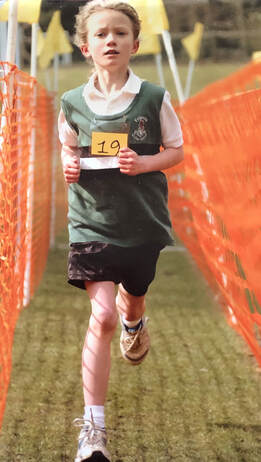

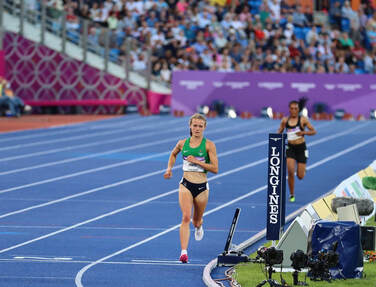
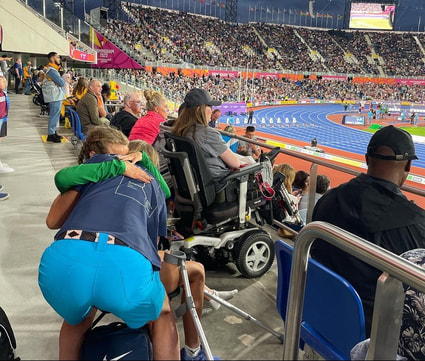
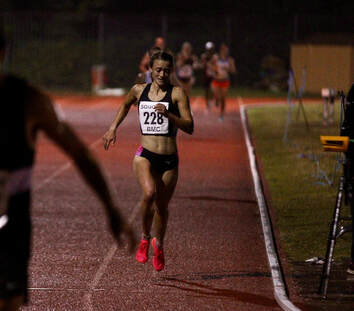
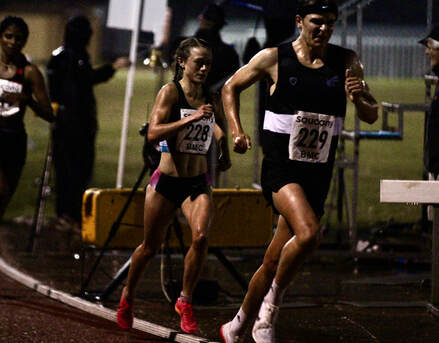

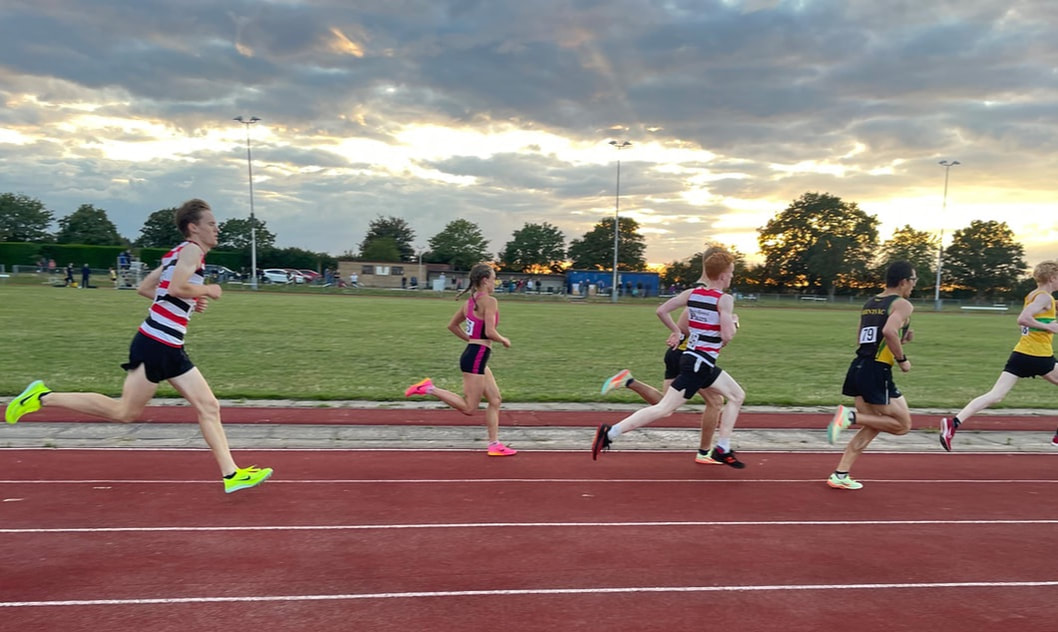

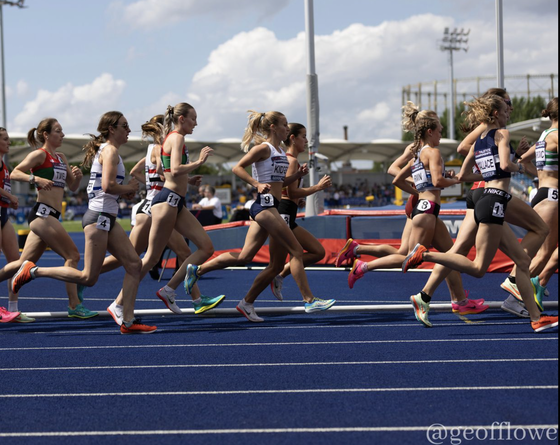
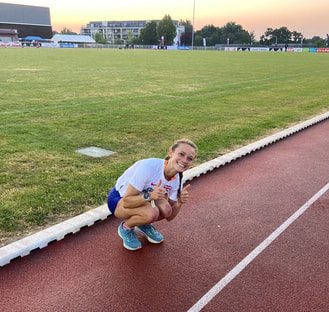
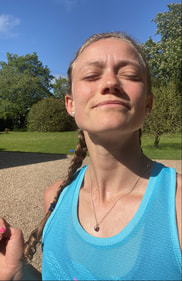
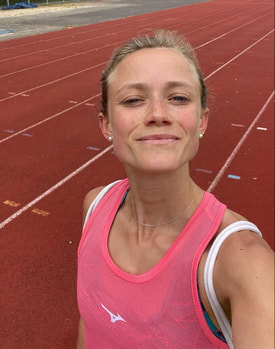
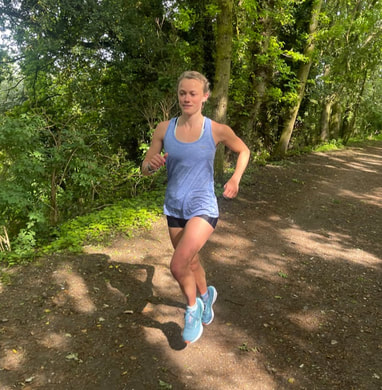
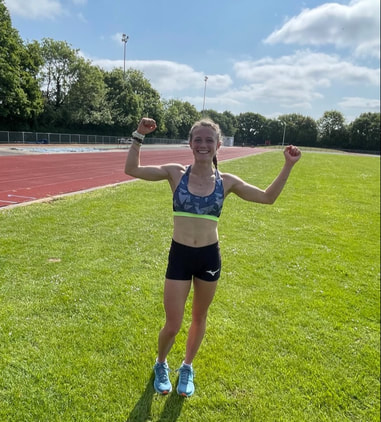
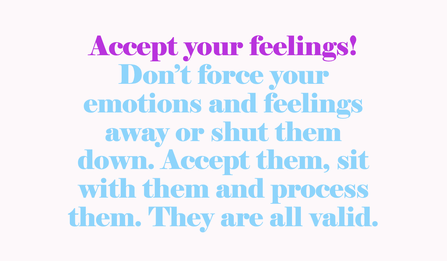
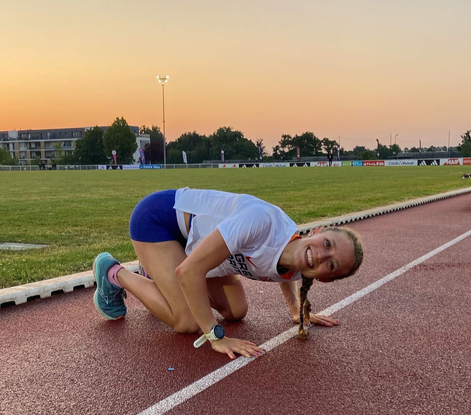

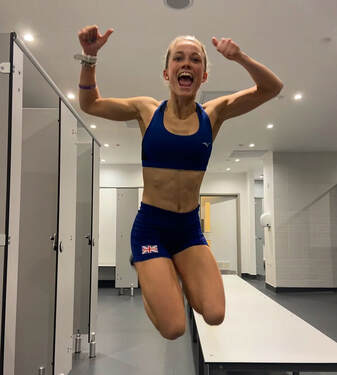

 RSS Feed
RSS Feed
